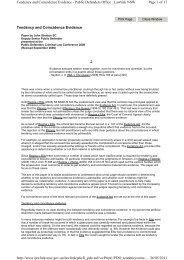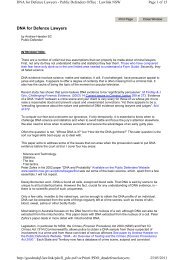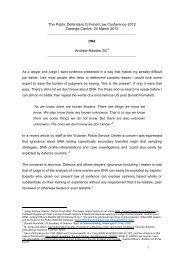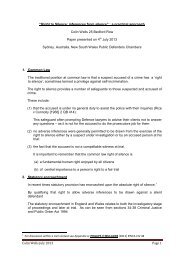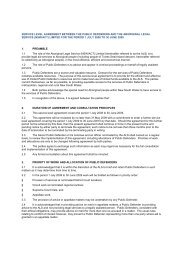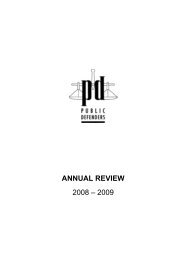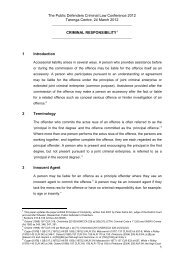Expert Evidence, by Dina Yehia SC - The Public Defenders
Expert Evidence, by Dina Yehia SC - The Public Defenders
Expert Evidence, by Dina Yehia SC - The Public Defenders
You also want an ePaper? Increase the reach of your titles
YUMPU automatically turns print PDFs into web optimized ePapers that Google loves.
MUST REVEAL PROCESS OF REASONING<br />
With respect to the second limb of section 79, it must be established that the opinion is wholly or substantially<br />
based on specialised knowledge. This requirement means that the reasoning process underpinning the<br />
witness’s conclusions must be made transparent so as to demonstrate that the opinion is so based.<br />
In Makita (Australia) Pty Ltd v Sprowles (2001) 52 NSWLR 705 the Court said, at [85]:<br />
And at [59]:<br />
“In short, if evidence is to be tendered as expert opinion evidence is to be admissible, it<br />
must be agreed or demonstrated that there is a field of ‘specialised knowledge’; there must<br />
be an identified aspect of that field in which the witness demonstrates that <strong>by</strong> reason of<br />
specified training, study or experience, the witness has become an expert; the opinion<br />
proffered must be ‘wholly or substantially based on the witness’ expert knowledge’; so far<br />
as the opinion is based on facts ‘observed’ <strong>by</strong> the expert, they must be identified and<br />
admissibly proved <strong>by</strong> the expert, and so far as the opinion is based on ‘assumed’ or<br />
‘accepted’ facts, they must be identified and proved in some other way; it must be<br />
established that the facts on which the opinion is based form a proper foundation for it; and<br />
the opinion of an expert requires demonstration or examination of the scientific or other<br />
intellectual basis of the conclusions reached: that is, the expert’s evidence must explain<br />
how the field of ‘specialised knowledge’ in which the witness is expert <strong>by</strong> reason of<br />
‘training, study or experience’, and on which the opinion is ‘wholly or substantially based’,<br />
applies to the facts assumed or observed so as to produce the opinion produced. If all<br />
these matters are not made explicit, it is not possible to be sure whether the opinion is<br />
based wholly or substantially on the expert’s specialised knowledge. If the court cannot be<br />
sure of that, the evidence is strictly speaking not admissible, and, so far as it is admissible,<br />
of diminished weight. And an attempt to make the basis of the opinion explicit may reveal<br />
that it is not based on specialised expert knowledge, but, to use Gleeson CJ’s<br />
characterisation of the evidence in HG v <strong>The</strong> Queen, on ‘a combination of speculation,<br />
inference, personal and second hand views, as to the credibility of the complainant, and a<br />
process of reasoning which went well beyond the field of expertise.”<br />
“If Professor Morton’s report were to be useful, it was necessary for it to comply with a<br />
prime duty of experts in giving opinion evidence: to furnish the trier of fact with criteria<br />
enabling evaluation of the validity of the expert’s conclusions.”<br />
In Jung per Hall J at [53]:<br />
“In the area of expert evidence, the test is whether the court is satisfied on the balance of<br />
probabilities that the opinion is based wholly or substantially on such knowledge: s142 of<br />
the <strong>Evidence</strong> Act.”<br />
In Risk v Northern Territory of Australia [2006] FCA 404 per Mansfield J at [469]:<br />
“<strong>The</strong> important thing in any expert’s report, in my view, is that the intellectual processes of<br />
the expert can be readily exposed. That involves identifying in a transparent way what are<br />
the primary facts assumed or understood. It also involves making the process of reasoning<br />
transparent, and where there are premises upon which the reasoning depends, identifying<br />
them.”<br />
<strong>The</strong> importance of the transparency of the process of reasoning was emphasised in Hannes v Director of<br />
<strong>Public</strong> Prosecutions (Cth) (No 2) [2006] NSWCCA 373 per Barr and Hall JJ at [290]:<br />
“Even though the spurious nature of the authority may be apprehended, and allowance<br />
made, there is a potentially more insidious risk that the exercise required of the Court or<br />
jury will be subverted through adoption of a shortcut, <strong>by</strong> acceptance of the opinion of<br />
another, without careful evaluation of the steps <strong>by</strong> which that opinion was reached.”<br />
7



